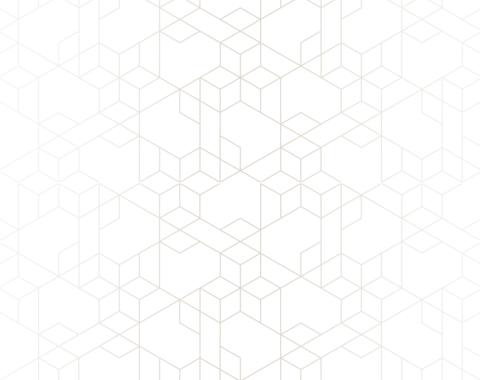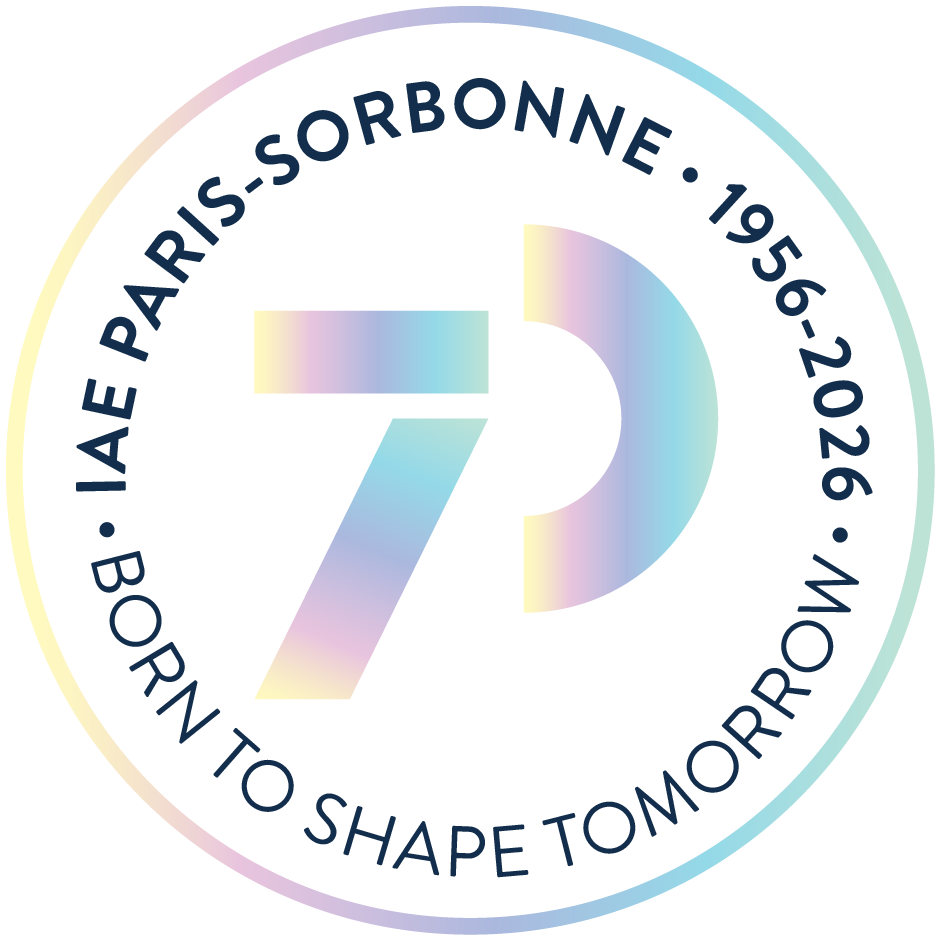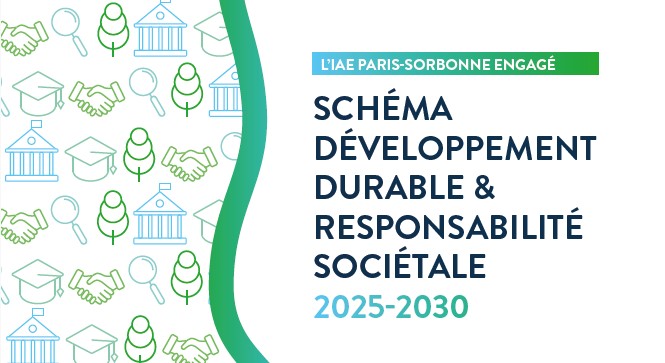

Structuring of long-standing CSR approach: first SD&RS master plan
The Sorbonne Business School adopted its first Sustainable Development and Corporate Social Responsibility Master Plan in 2025, voted at the June 24 board meeting.
This SD&RS schema helps to structure Sorbonne Business School's cross-functional commitment to societal issues, integrated into governance since 2021 and spearheaded by Nathalie Lallemand-Stempak, Senior Lecturer, Director delegated to societal issues, and Philippe Eynaud, Professor, Head of CSR. Built in a participative mode, it gives coherence to existing actions, while enabling the impetus of new dynamics and helping the establishment to progress collectively.
While its implementation is part of a national approach, it also responds to the conviction that the Sorbonne Business School has a particular responsibility to assume in the ecological and social transition as a player in the training of tomorrow's economic decision-makers. It is also about embodying exemplarity by transforming its own practices in a transversal way,in terms of teaching, research and the steering of its organization.
In line with a continuous improvement approach, this steering document guides the establishment's actions that will be deployed progressively from 2025 to 2030 in terms of sustainable development, ethics, governance and social impact, through 5 major pillars:
Environment
- Reducing greenhouse gas emissions
- Managing internal stakeholder travel
- Implementing a pollution prevention and reduction policy
Social policy
- Implementing and communicate internally on a policy of quality of life at work
- Prepare for the arrival of future students
- Define conditions favorable to the success of students with disabilities
- Develop conditions of study and accessibility
- Prepare for the arrival of future students
- Define conditions favorable to the success of students with disabilities
- Define conditions favorable to the success of students with disabilities
- Develop conditions of study and accessibility study conditions and accessibility of our training courses
Strategy & governance
- Monitor the implementation of DD&RS projects through the work of referents and the DD&RS cell
- Integrate the approach into all services
Education & training & training
- Integrate DD&RS issues into all programs and teaching
- Put DD&RS knowledge into practice (encourage student projects and initiatives)
- Train all future teachers, doctoral students and internal Sorbonne Business School staff to DD&RS issues
Research
- Incorporate DD&RS research practices
- Identify the DD&RS impacts of research questions
- Identify and take into account DD&RS issues in Research projects
- Contribute to Research projects related to DD&RS issues
> Consult the Sustainable Development & Social Responsibility (SD&RS) master plan
Concretely?
Because it has set it self the mission of positively impacting the world via training and research in a responsible approach, the Sorbonne Business School has been keen for several years to integrate societal issues transversally into its teaching. The 2025-2030 strategic plan provides for the generalization of transition issues to all its training courses with the aim of continuing to broaden and deepen knowledge of sustainability and supporting students in the implementation of new managerial practices in line with major contemporary challenges. In a complementary move, during the 2025-2026 academic year, all Sorbonne Business School students will take Sullitest's TASK, the first international certification in sustainability knowledge, to ensure that the foundation of knowledge in environmental transition and societal development (TEDS) has been mastered.
To instill a shared culture of responsible management, the Sorbonne Business School is also taking an active approach to raising awareness among its entire community, students and staff alike, through specific actions such as conferences, collaborative workshops (climate fresco, biodiversity fresco, digital fresco, 2tonnes workshop) or cooperative challenges (My Little Planet). At the start of the 2025 school year, during the first edition of a pre-entry day, the 412 or so new apprentices enjoyed a forum theater presentation on the theme of diversity, led by the Co-Theater company. The school is continuing its dynamic training of administrative and teaching staff with the Campus de la Transition: a new seminar is planned within this framework in autumn 2025.
At school level, concrete actions are being taken toimprove resource and waste management with the generalization of selective sorting in particular, as well as to ensure a responsible purchasing policy. From January 2026, in its new building at 11-15 rue Ponscarme, The Sorbonne Business School will have a working environment with the highest standards in terms of environmental performancewith BREEAM certification at the "Very good" level.
The Sorbonne Business School is also committed to offsetting greenhouse gas emissions: it is the first university establishment to have implemented such projects certified by the Label Bas Carbone (LBC) promoted by the Ministry of Ecological Transition and Cohesion of Territories. Since 2020, the establishment has financed six afforestation and reforestation projects designed by CNPF, in Gironde, Vendée, Oise and recently in Pas-de-Calais. A new project in the Creuse region is currently being finalized.
To take things a step further, the school is finalizingat the start of the 2025 school yearits first greenhouse gas emissions assessment (BEGES), enabling it to initiate measurable reduction measures alongside offsetting, with the ultimate goal of carbon neutrality.
The aim is also to provide a specific response to these issues through committed research, working on the contributions of management sciences in this field, enriching programs with new thinking and supporting organizations in their evolutions and transformations. In this way, research activity at the Sorbonne Business School, driven by the LAB Sorbonne Business School laboratory and its 7 chairs, is now oriented around three major societal challenges identified by the establishment as part of the United Nations' Sustainable Development Goals (SDGs):
- Quality of working life and professional development;
- Responsible consumption and production;
- Partnerships.
The laboratory has also set up an annual award for the best DDRSE thesis, which has attracted a great deal of interest with 14 entries for its first edition in 2024-2025: Alexandre Nassar was rewarded for his work on decoding and the impact of brand activism in favor of the LGBT cause.
In terms of social transition, the Sorbonne Business School deploys an active policy in favor of the fight against discrimination, harassment and sexist and sexual violence or gender equality. Numerous actions have thus been implemented, illustrating the establishment's commitment to inclusion, equality and respect. Among them, the SPACE "Sensibiliser-Protéger-Accompagner-Communiquer-Écouter" prevention scheme coordinated since 2022 by the establishment's anti-discrimination, harassment and sexist and sexual violence (VSS) unit. This initiative specific to the Sorbonne Business School, which has received support from the Ministry of Higher Education and Research as part of the 2021-2025 national plan to combat SGBV, is based on:
- the formation of a network of sentinels as resource persons among staff and the student populationto facilitate the gathering and freeing of the word, made up each year of some fifteen volunteers, whose new 2025-2026 cohort will benefit, in addition to training in the prevention of SGBV, from training provided by the LICRA;
- a specific information campaign to provide information on the SPACE scheme and present resource people to contact;
- specific awareness-raising workshops for students, including the pursuit of the generalization of 6 hours dedicated to societal issues, including SSV, in training programs.
Concerned with student well-being, The Sorbonne Business School plans to have all its students pass a certificate on psycho-social risks during the 2025-2026 academic year.
In addition, at the start of this academic year, the establishment is finalizing its new gender equality plan, which will be presented to the Board of Directors on September 30, 2025. It was drawn up as part of a collective approach over the course of the 2024-2025 academic year, conducted within a mixed and joint working group comprising teaching and administrative staff. More than an inventory of the equality situation at the Sorbonne Business School, it proposes a set of actions articulated around 4 objectives:
- promote gender diversity at all levels;
- ensure real power-sharing;
- guarantee equal pay and equal access to career progression;
- transmit these equality requirements to students, the future actors and actresses of the professional world.
Puttingequal opportunities at the heart of its mission, the Sorbonne Business School has been a member of the Permanent Conference of Equality and Diversity Officers since 2023, a solid and dynamic network to pursue its commitments. Its priorities in terms of equality and diversity today rest on 4 axes:
- systematize the collection and guarantee the quality of gender data in all areas of its activities and operations;
- foster the appropriation of equality issues by all teams and our audiences by combating, in particular, selection bias and stereotypes;
- remove the obstacles to career progression for female academics;
- make the reconciliation of private and professional life a project for the benefit of all.
--
This page is an extract from the back-to-school 2025 press kit.

